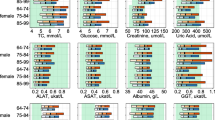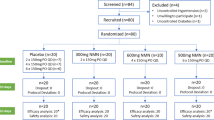Abstract
Purpose
Depression clinical trials are increasingly studying biomarkers to predict and monitor response to treatment. Assessment of biomarkers may reveal subsets of patients who are responsive to nutraceutical treatment, which may facilitate a personalized approach to treating depression.
Methods
This is a post hoc analysis of an 8-week, double-blind, randomized, controlled trial (n = 158) investigating a combination nutraceutical comprising Omega-3 (EPA 1 g/DHA 656 mg), SAMe, zinc, 5-HTP, folinic acid, and co-factors versus placebo for the treatment of Major Depressive Disorder. The study explored levels of polyunsaturated fatty acids, folate, vitamin B12, zinc, homocysteine, and BDNF as possible predictors and correlates of response to nutraceutical supplementation.
Results
Concentrations of EPA and DHA in red cell membranes increased in response to treatment and were significantly correlated with a decrease in depressive symptoms during active treatment (p = 0.003 and p = 0.029; respectively). Higher baseline levels of omega-6 fatty acid also correlated with depression reduction in the active treatment group ( p = 0.011). No other biomarkers were associated with a lessening of depressive symptoms.
Conclusion
Changes in fatty acid levels resulting from a nutraceutical combination containing EPA and DHA provide a response biomarker in treating depression.

Similar content being viewed by others
References
Rush AJ (2007) Limitations in efficacy of antidepressant monotherapy. J Clin Psychiatry 68(Suppl 1):8–10
Sarris J, Logan AC, Akbaraly TN et al (2015) Nutritional medicine as mainstream in psychiatry. Lancet Psychiatry 2:271–274. https://doi.org/10.1016/S2215-0366(14)00051-0
Sarris J, Murphy J, Mischoulon D, et al (2016) Adjunctive nutraceuticals for depression: a systematic review and meta-analyses. Am J Psychiatry appiajp201615091228. https://doi.org/10.1176/appi.ajp.2016.15091228
Raison CL, Rutherford RE, Woolwine BJ et al (2013) A randomized controlled trial of the tumor necrosis factor antagonist infliximab for treatment-resistant depression: the role of baseline inflammatory biomarkers. Arch Gen Psychiatry. https://doi.org/10.1001/2013.jamapsychiatry.4
Rao TSS, Asha MR, Ramesh BN, Rao KSJ (2008) Understanding nutrition, depression and mental illnesses. Indian J Psychiatry 50:77–82. https://doi.org/10.4103/0019-5545.42391
Venigalla H, Mekala HM, Hassan M et al (2017) An update on biomarkers in psychiatric disorders—are we aware, do we use in our clinical practice? Ment Health Fam Med 13:471–479
Sarris J, Byrne GJ, Stough C et al (2019) Nutraceuticals for major depressive disorder—more is not merrier: an 8-week double-blind, randomised, controlled trial. J Affect Disord 245:1007–1015. https://doi.org/10.1016/J.JAD.2018.11.092
Sarris J, Stough C, Bousman C et al (2015) An adjunctive antidepressant nutraceutical combination in treating major depression: study protocol, and clinical considerations. Adv Integr Med 2:49–55. https://doi.org/10.1016/j.aimed.2015.02.001
Rapaport MH, Nierenberg AA, Schettler PJ et al (2015) Inflammation as a predictive biomarker for response to omega-3 fatty acids in major depressive disorder: a proof-of-concept study. Mol Psychiatry. https://doi.org/10.1038/mp.2015.22
Carney RM, Steinmeyer BC, Freedland KE et al (2016) Baseline blood levels of omega-3 and depression remission: a secondary analysis of data from a placebo-controlled trial of omega-3 supplements. J Clin Psychiatry. https://doi.org/10.4088/JCP.14m09660
Mazereeuw G, Herrmann N, Andreazza AC et al (2017) Oxidative stress predicts depressive symptom changes with omega-3 fatty acid treatment in coronary artery disease patients. Brain Behav Immun. https://doi.org/10.1016/j.bbi.2016.10.005
Freeman MP, Hibbeln JR, Silver M et al (2011) Omega-3 fatty acids for major depressive disorder associated with the menopausal transition: a preliminary open trial. Menopause. https://doi.org/10.1097/gme.0b013e3181f2ea2e
Ganança L, Galfalvy HC, Oquendo MA et al (2017) Lipid correlates of antidepressant response to omega-3 polyunsaturated fatty acid supplementation: a pilot study. Prostaglandins Leukot Essent Fat Acids. https://doi.org/10.1016/j.plefa.2017.03.004
Martins JG (2009) Epa but not dha appears to be responsible for the efficacy of omega-3 long chain polyunsaturated fatty acid supplementation in depression: evidence from a meta-analysis of randomized controlled trials. J Am Coll Nutr. https://doi.org/10.1080/07315724.2009.10719785
Lin P-Y, Huang S-Y, Su K-P (2010) A meta-analytic review of polyunsaturated fatty acid compositions in patients with depression. Biol Psychiatry 68:140–147. https://doi.org/10.1016/j.biopsych.2010.03.018
Lai J, Moxey A, Nowak G et al (2012) The efficacy of zinc supplementation in depression: systematic review of randomised controlled trials. J Affect Disord 136:e31–e39. https://doi.org/10.1016/j.jad.2011.06.022
Firth J, Teasdale SB, Allott K et al (2019) The efficacy and safety of nutrient supplements in the treatment of mental disorders: a meta-review of meta-analyses of randomized controlled trials. World Psychiatry 18(3):308–324
Syed EU (2013) Vitamin B12 supplementation in treating major depressive disorder: a randomized controlled trial. Open Neurol J. https://doi.org/10.2174/1874205x01307010044
Desseilles M, Witte J, Chang TE et al (2013) Massachusetts general hospital SAFER criteria for clinical trials and research. Harv Rev Psychiatry 21:269–274. https://doi.org/10.1097/HRP.0b013e3182a75cc7
Zhou C, Zhong J, Zou B et al (2017) Meta-analyses of comparative efficacy of antidepressant medications on peripheral BDNF concentration in patients with depression. PLoS One. https://doi.org/10.1371/journal.pone.0172270
Wickham H (2009) Ggplot2: elegant graphics for data analysis. Springer, Berlin
van der Burg KP, Cribb L, Firth J, Karmacoska D, Sarris J (2019) Nutrient and genetic biomarkers of nutraceutical treatment response in mood and psychotic disorders: a systematic review. Nutr Neurosci. https://doi.org/10.1080/1028415X.2019.1625222
Carney RM, Freedland KE, Rubin EH et al (2009) Omega-3 augmentation of sertraline in treatment of depression in patients with coronary heart disease: a randomized controlled trial. JAMA. https://doi.org/10.1001/jama.2009.1487
Grosso G, Galvano F, Marventano S, Malaguarnera M, Bucolo C, Drago F, Caraci F (2014) Omega-3 fatty acids and depression: Scientific evidence and biological mechanisms. Oxid Med Cell Longev. 2014:313570. https://doi.org/10.1155/2014/313570
Moylan S, Berk M, Dean OM et al (2014) Oxidative & nitrosative stress in depression: why so much stress?. Neurosci Biobehav, Rev
Raison CL, Capuron L, Miller AH (2006) Cytokines sing the blues: inflammation and the pathogenesis of depression. Trends Immunol 27:24–31
Stark KD, Van Elswyk ME, Higgins MR et al (2016) Global survey of the omega-3 fatty acids, docosahexaenoic acid and eicosapentaenoic acid in the blood stream of healthy adults. Prog, Lipid Res
Lin PY, Huang SY, Su KP (2010) A meta-analytic review of polyunsaturated fatty acid compositions in patients with depression. Biol Psychiatry. https://doi.org/10.1016/j.biopsych.2010.03.018
Sarris J, Murphy J, Mischoulon D et al (2016) Adjunctive nutrient nutraceuticals for depression: a systematic review and meta-analyses. Am J Psychiatry 173:575–587
Brown RD, Langshaw MR, Uhr EJ et al (2011) The impact of mandatory fortification of flour with folic acid on the blood folate levels of an Australian population. Med J Aust 194:65–67
Polyakova M, Stuke K, Schuemberg K et al (2015) BDNF as a biomarker for successful treatment of mood disorders: a systematic & quantitative meta-analysis. J Affect, Disord
McIntyre RS, Subramaniapillai M, Lee Y et al (2019) Efficacy of adjunctive infliximab vs placebo in the treatment of adults with bipolar I/II depression: a randomized clinical trial. JAMA Psychiatry. https://doi.org/10.1001/jamapsychiatry.2019.0779
Lapillonne A, DeMar JC, Nannegari V, Heird WC (2002) The fatty acid profile of buccal cheek cell phospholipids is a noninvasive marker of long-chain polyunsaturated fatty acid status in piglets. J Nutr 132:2319–2323
Lopresti AL, Maker GL, Hood SD, Drummond PD (2014) A review of peripheral biomarkers in major depression: the potential of inflammatory and oxidative stress biomarkers. Prog Neuro-Psychopharmacol Biol Psychiatry 48:102–111
Miller AH, Raison CL (2016) The role of inflammation in depression: from evolutionary imperative to modern treatment target. Nat Rev Immunol 16:22
Acknowledgements
JS is supported by an NHMRC Clinical Research Fellowship (APP 1125000). JF is supported by a Blackmores Institute Fellowship. MB is supported by a National Health and Medical Research Council (NHMRC) Senior Principal Research Fellowship (APP1059660 and APP1156072). The original study was funded by an Australian National Health and Medical Research Council project grant (APP1048222), and was co-sponsored by FIT-BioCeuticals (who were not involved in any aspect of study design, statistical analysis, or manuscript preparation).
Funding
National Health and Medical Research Council APP1048222; FIT-BioCeuticals (co-sponsor, uninvolved in study design and conduct, data analysis, and manuscript preparation).
Author information
Authors and Affiliations
Contributions
KvdB drafted the initial version of this manuscript. All authors contributed intellectual content to the manuscript and read and approved the final manuscript.
Corresponding author
Ethics declarations
Conflict of interest
JS has received either presentation honoraria, travel support, clinical trial grants, book royalties, or independent consultancy payments from: Integria Healthcare & MediHerb, Pfizer, Scius Health, Key Pharmaceuticals, Taki Mai, FIT-BioCeuticals, Blackmores, Soho-Flordis, Healthworld, HealthEd, HealthMasters, Kantar Consulting, Grunbiotics, Research Reviews, Elsevier, Chaminade University, International Society for Affective Disorders, Complementary Medicines Australia, SPRIM, Terry White Chemists, ANS, Society for Medicinal Plant and Natural Product Research, Sanofi-Aventis, Omega-3 Centre, the National Health and Medical Research Council, CR Roper Fellowship. DM has received research support from Nordic Naturals. He has provided unpaid consulting for Pharmavite LLC and Gnosis USA, Inc. He has received honoraria for speaking from the Massachusetts General Hospital Psychiatry Academy, Blackmores, Harvard Blog, and PeerPoint Medical Education Institute, LLC. He has received royalties from Lippincott Williams & Wilkins for published book “Natural Medications for Psychiatric Disorders: considering the Alternatives.”MB has been a speaker for Lundbeck, Merck, and Servier; has served as a consultant to Allergan, Astra Zeneca, Bioadvantex, Bionomics, Collaborative Medicinal Development, Janssen Cilag, Lundbeck Merck, and Servier; and has received Grant/Research Support from the A2 Company, the Meat and Livestock Board, Woolworths, and Avant. CHN had served as a consultant for Grunbiotics, Lundbeck, Servier, Janssen-Cilag, Wyeth, and Eli Lilly, and received research grant support from Wyeth and Lundbeck, and speaker honoraria from Servier, Lundbeck, Bristol-Myers Squibb, Organon, Eli Lilly, GlaxoSmithKline, Janssen- Cilag, Astra-Zenaca, Wyeth, and Pfizer.
Rights and permissions
About this article
Cite this article
van der Burg, K.P., Cribb, L., Firth, J. et al. EPA and DHA as markers of nutraceutical treatment response in major depressive disorder. Eur J Nutr 59, 2439–2447 (2020). https://doi.org/10.1007/s00394-019-02090-6
Received:
Accepted:
Published:
Issue Date:
DOI: https://doi.org/10.1007/s00394-019-02090-6




